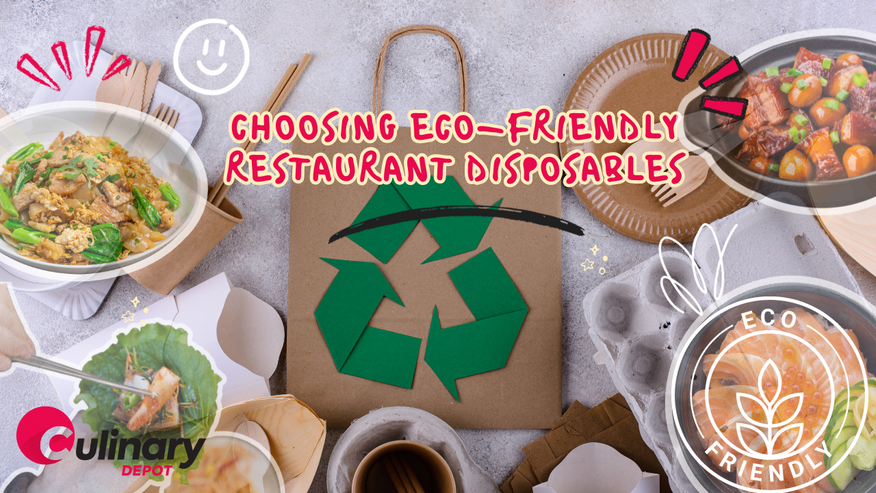Oct 16th 2023 - Team Member
Sustainability in the Kitchen: Choosing Eco-Friendly Restaurant Disposables
In the modern food service industry, sustainability isn't just a buzzword; it's a vital commitment to the environment, customer well-being, and cost-efficiency. For restaurants and commercial kitchens, one significant area where sustainability can be achieved is in the choice of restaurant disposables. By opting for eco-friendly restaurant disposables, you can positively impact the environment while meeting the growing demand for green alternatives.
Understanding the Eco-Friendly Approach
The Eco-Friendly Imperative

Environmental Responsibility
- Sustainable practices are crucial to minimizing the restaurant industry's environmental footprint.
- Eco-friendly disposables are a step towards reducing waste and conserving resources.
Meeting Customer Expectations
- Today's customers are increasingly eco-conscious, making sustainable choices more appealing.
- Offering eco-friendly disposables aligns with customer values and may enhance your brand's reputation.
Types of Eco-Friendly Restaurant Disposables
Biodegradable Disposables

Earth-Friendly Materials
- Biodegradable disposables are made from natural materials like cornstarch, sugarcane, and bamboo.
- They break down into organic matter, reducing landfill waste.
Diverse Options
- Biodegradable options include cutlery, plates, cups, and to-go containers.
- These disposables are sturdy and suitable for various food service needs.
Compostable Disposables
A Circular System
- Compostable disposables are designed to decompose into nutrient-rich compost.
- They contribute to a sustainable and closed-loop system when processed correctly.
Packaging and Utensils
- Compostable disposables extend to food containers, napkins, and utensils.
- They provide a green alternative for various food packaging needs.
Recycled Content Disposables
Repurposed Resources
- Recycled content disposables are made from post-consumer or post-industrial recycled materials.
- These disposables reduce the demand for virgin resources.
Paper and Plastic Options
- Recycled content disposables can include paper products like napkins, paper towels, and recycled plastic items.
- They serve multiple purposes while conserving resources.
Factors to Consider
Choosing Eco-Friendly Disposables

Material Source
- Understand the source of materials used in eco-friendly disposables.
- Verify that they are genuinely eco-conscious, such as FSC-certified paper or plant-based plastics.
End-of-Life Disposal
- Consider how these disposables can be appropriately disposed of.
- Provide clear guidelines for customers and staff on composting or recycling.
Cost and Quality
- Evaluate the cost implications and ensure they align with your budget.
- Assess the quality and durability of eco-friendly disposables to meet your operational needs.
Brand Image and Customer Perception
- Choose disposables that align with your brand's values and image.
- Communicate your commitment to sustainability to your customers.
Conclusion
Adopting eco-friendly restaurant disposables is a proactive step in reducing the environmental impact of your commercial kitchen while catering to the preferences of environmentally-conscious consumers. Biodegradable, compostable, and recycled content disposables are viable options that promote sustainability and contribute to a more circular and eco-conscious food service industry.
By making informed choices and emphasizing the importance of sustainability, your restaurant can enjoy the benefits of reduced environmental footprint, increased customer loyalty, and a positive brand image. Sustainability is not just a trend; it's a transformative commitment to a greener future in the food service industry.

